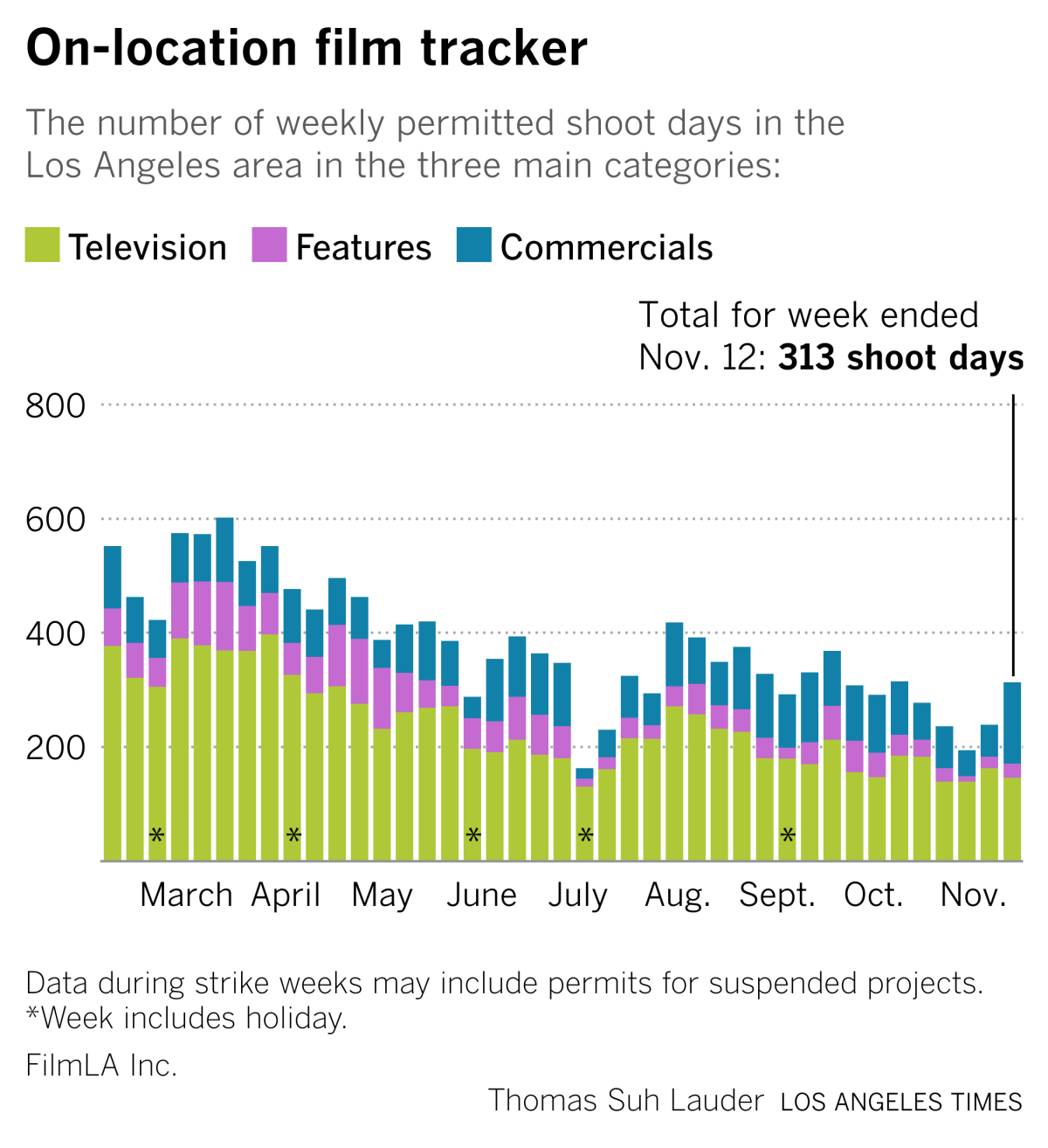Nathan Fielder’s strange black comedy ‘The Curse’ is why we’ll miss Peak TV

In many ways, Nathan Fielder and Benny Safdie’s black comedy “The Curse” feels designed to become a zeitgeist show.
It features Fielder, TV’s cringe king, and Oscar winner Emma Stone as an ecofriendly house-flipping couple trying to make an HGTV show. That effort, by its nature, exploits the Native American and Latino communities in Española, N.M., near Santa Fe, while at the same time projecting their own righteousness as do-gooders for those same locals.
If “gentrification offsets” existed, this wannabe power couple would be all over that market. The series skewers white guilt, virtue signaling, high-art pretentiousness and reality TV contrivances.
Some scenes are painful enough to make your teeth hurt, like when Fielder’s character offers a young girl a $100 bill in a parking lot while the cameras are rolling, only to later demand it back.
The series, co-produced by Showtime Studios and indie darling A24 and streaming on the recently rebranded Paramount+ With Showtime, also could serve as a telling artifact of Hollywood’s Peak TV era, a time of insatiable demand for content on streaming platforms and premium cable networks. It’s the kind of gamble that will only become harder to make as the business shrinks.
“It started out as a 30-minute comedy and became an hour-long comedy-drama,” Safdie told GQ in a July interview, in what now sounds like a comment left over from a certain “why not?” moment in the TV business, when content budgets were flush at streaming services that were desperate to compete with Netflix
That gold rush appears to have passed its pinnacle.
Last year, streamers and TV networks produced a record 599 scripted shows, according to FX Networks’ annual analysis. Sources speaking to my colleague Meg James have said the number of shows made during the first half of this year, before the impact of the writers’ and actors’ strikes, was down about 10% compared with the first six months of 2022.
Thanks to a pullback in content spending at the entertainment companies and the effects of the two debilitating strikes, there’s expected to be less stuff made, and a lower appetite for risk.
Industry observers and Wall Street analysts have complained about there being too much TV and a glut of streaming services. That’s sure to give way to a period of corporate consolidation in the next couple of years and, perhaps, a rebundling of services online, reminiscent of cable and satellite packages.
But as a viewer, I’ll miss the Wild West days.
“The Curse” came to Showtime when David Nevins still ran the network, long a respected but distant No. 2 to HBO in the premium cable space. Amy Israel, head of original scripted programming at the time, bought the series based on Fielder and Safdie’s pitch and oversaw development and production.
Early this year, Paramount Global merged Showtime Studios with MTV Entertainment Studios under Chris McCarthy, in a sign of the industry consolidation to come. Underperforming shows were canceled as Showtime’s strategy was reconfigured to double down on potential franchises including “Billions” and “Dexter.” The streaming brands of Paramount+ and Showtime were mashed together as well, timed with a price hike. Nevins now runs Peter Chernin’s North Road Co. as chief executive, with Israel serving as head of TV there.
But “The Curse” survived. And now it’s having a bit of a moment, at least among a very enthusiastic subset of viewers and commentators (as of September, Paramount+ has 63 million subscribers, and the company has not released viewership stats for the series).
Parts of the show seem destined to become social media memes, in the vein of Netflix’s “I Think You Should Leave.”
The gulf between Fielder’s and Stone’s acting abilities has been played for much comedy online and elsewhere. Fielder is known for sowing discomfort in viewers with his chilly deadpan on reality-adjacent shows “Nathan for You” and “The Rehearsal.” Stone, meanwhile, is one of the most compelling onscreen performers of her generation and is poised for a best actress nomination for her role in another idiosyncratic comedy, Yorgos Lanthimos’ “Poor Things.”
Stone’s presence and gameness is one of the aspects that makes the series a prime prestige TV curiosity (“They got her to do this?” one can imagine viewers asking). Fielder, Stone and the show’s marketing team leaned into their couple’s intentionally awkward dynamic with a viral parody of Sydney Sweeney and Glen Powell’s promo for an upcoming studio rom-com.
A24 being brought in to co-produce lends brand credibility from a studio that had worked with the Safdie brothers on their Adam Sandler film “Uncut Gems” and, previously, the Robert Pattinson-starring “Good Time.” The Safdies embrace a tone, amplified by Oneohtrix Point Never’s ominous scoring, that makes viewers squirm. It’s certainly not for everyone.
As such, it’s not obvious which other network would pick up something like “The Curse” today or a couple of years from now. HBO normally would have been a logical choice for it, having served as the home of Fielder’s earlier high-profile effort, “The Rehearsal.” But HBO’s parent company, Warner Bros. Discovery, owns HGTV, the target of much of Fielder and Safdie’s satire of reality television.
Networks and streamers are taking safer bets, often focusing on revamping existing intellectual property. Studios are punting on riskier productions, even sometimes when they do have beloved IP attached to them.
Producers and writers always want the industry to have more buyers. Having a ton of outlets creates a system in which ambitious artists can take more and weirder shots. (Speaking of which, I’m also a fan of the Craig Robinson-starring “Killing It,” another dark comedy with anticapitalist overtones, which streams on Comcast’s Peacock.)
This is not to say that shows like “The Curse” wouldn’t have existed without a TV business that relentlessly supersized over the last few years. But with a smaller, more uncertain environment, you’ll likely see fewer of them.
You’re reading the Wide Shot
Ryan Faughnder delivers the latest news, analysis and insights on everything from streaming wars to production — and what it all means for the future.
You may occasionally receive promotional content from the Los Angeles Times.
Stuff we wrote

Bob Iger was brought back to fix Disney. No one said it would be easy. The Burbank company has a hangover from its big streaming push. The stock has struggled, investors are restive and its key studios have been stretched.
NFL reporter Charissa Thompson said she made up sideline reports. TV sports journalists are furious. Thompson, who has reported for Fox Sports and Amazon, said on a Barstool Sports podcast that she has fabricated coaches’ remarks when she can’t get access during the game. No big deal, right?
Why Snoop Dogg and his son are launching Death Row Games: ‘You gotta have representation.’ The new studio, Death Row Games, aims to empower diverse creators to publish on “Fortnite.” The venture is Snoop Dogg’s latest foray into gaming.
‘Coyote vs. Acme’: Why Hollywood revolted against Warner Bros. over a Looney Tunes movie. Filmmakers are rallying behind “Coyote vs. Acme,” the Looney Tunes movie killed — and later sort of resurrected — by Warner Bros. Discovery.
Univision news anchor León Krauze departs after network’s controversial Trump interview. The veteran Los Angeles anchor’s exit comes amid internal discontent over Univision’s cozy Nov. 10 conversation with the former president.
CBS to air 2024 Golden Globes, ending awards’ longtime partnership with NBC. CBS announced Friday that it will televise the 81st Golden Globes on Jan. 7. The awards, which were rocked by scandal following a 2021 Times investigation, had aired on NBC since 1996.
Quotable
“In any kind of negotiation like this, you have to find the balance. We pushed our leverage to the max. ... I think that leverage would not have increased from us remaining on strike longer, and I believe we achieved the best possible deal that could have been achieved in connection with AI in this negotiation.”
— SAG-AFTRA chief negotiator Duncan Crabtree-Ireland, defending the union’s tentative deal against criticism from members worried that the deal’s AI protections don’t go far enough.
Number of the week

The great tech and entertainment pullback has hit the video game business too, post-pandemic.
“Roughly 6,500 video game workers have been laid off globally since January, including hundreds at California-based companies, according to industry estimates,” writes Sarah Parvini. And some analysts believe the figure could be much higher. The reported number represents about 2% of the industry’s estimated global workforce.
A number of factors have contributed to the contraction. “In addition to post-pandemic turbulence and the reality of cuts after acquisitions, layoffs also are the result of an influx of companies trying to break into live service games and greater competition for gamers’ limited screen time,” Parvini writes.
Film shoots
On-location shooting days ticked up last week, according to FilmLA data. Before probably going down again because of the Thanksgiving holiday.

Best of the web
— The Hollywood Reporter examines how TMZ became “Hollywood’s grim reaper,” following the outlet’s tipoffs about Matthew Perry’s death and other stories.
— Another day, another beast of a David Zaslav profile that runs down the Warner Bros. Discovery chief’s foray into Hollywood since orchestrating the giant media merger. (New York Times)
— Bring on the “OpenAI in chaos” tick-tocks! Here’s one from the Atlantic: “Sam Altman’s weekend of shock and drama began a year ago, with the release of ChatGPT.” Microsoft hired Altman on Monday.
— Major advertisers flee X, deepening the crisis at Elon Musk’s social media site formerly known as Twitter. (CNN) X’s CEO Linda Yaccarino says that reports of antisemitic content on the platform come from a “misleading and manipulated article.”
Finally ...
Deafheaven’s “Sunbather” came out 10 years ago. It’s still one of my favorite albums for long runs.
The Wide Shot is going to Sundance!
We’re sending daily dispatches from Park City throughout the festival’s first weekend. Sign up here for all things Sundance, plus a regular diet of news, analysis and insights on the business of Hollywood, from streaming wars to production.
You may occasionally receive promotional content from the Los Angeles Times.




